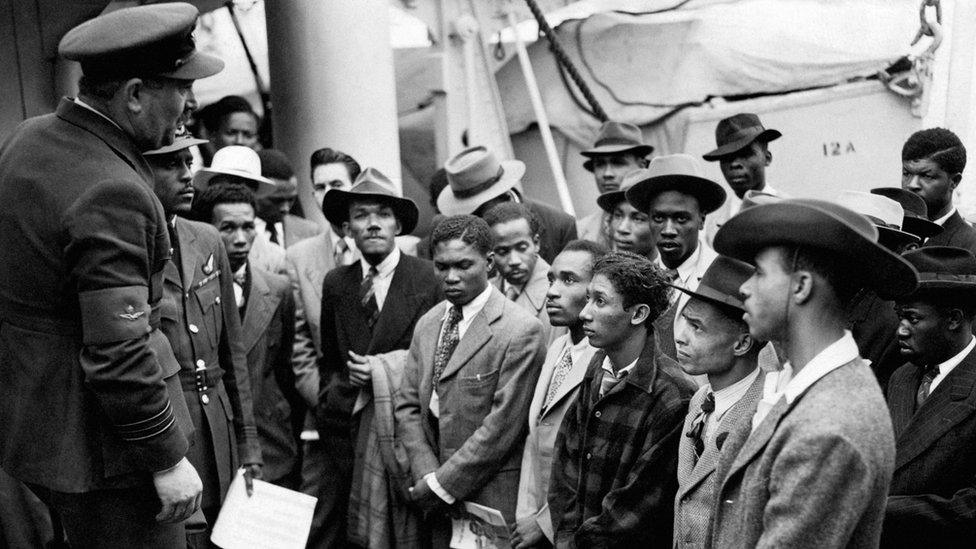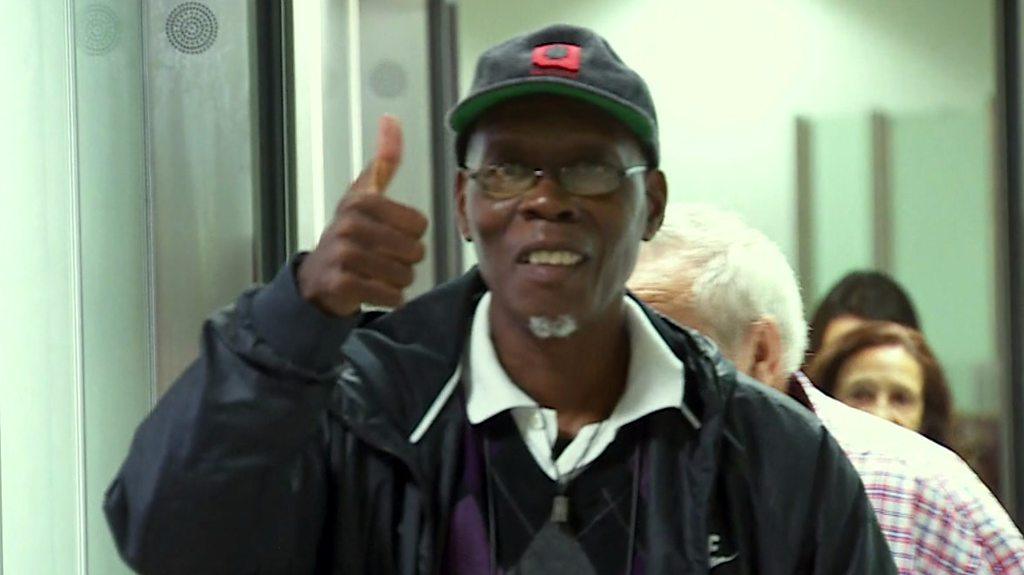Windrush scandal: Eligible victim wrongly denied help
- Published
Willow Sims says her mental health - and family - are suffering as she tries to resolve the issue
The lawyer overseeing a compensation scheme for victims of the Windrush scandal has asked for "urgent clarification" after a woman was wrongly refused Home Office help.
Willow Sims, who came to the UK aged four, has found herself in debt and facing eviction and deportation after losing her right to work.
Proof of her indefinite leave to remain was lost when she entered foster care.
The Home Office now says it is helping Ms Sims resolve her case.
"I feel like I don't exist," she said. "My whole life has fallen apart."
Ms Sims moved to the UK from the US with her mother and has lived in the UK for more than 35 years.

Willow Sims (left) lost her right to work in the UK, despite having lived in the country since she was four
She was put in foster care as a teenager after her mother died, and it was around this time that much of her documentation was lost - including family photos and her original passport declaring she has indefinite leave to remain.
Last April she was subjected to a routine DBS (Disclosure and Barring Service) check by her employers, Lewisham Council.
She holds a US passport from her time in care stating she was granted leave to remain in a previous passport, and the BBC has seen documents in her care files which prove she has been known to her local authority since at least the age of seven.
Nevertheless, the council said this was not enough evidence.
"They accused me and my mum of being illegal immigrants and said I'd forged my passport," she said.
"I was a child and feel like I've been put on trial for something I couldn't control."
Ms Sims lost her right to work, access to healthcare and benefits. She is now thousands of pounds in debt and relying on food banks, despite 20 years' experience in social care and as a primary school teaching assistant.
'No ties to the Caribbean'
The Windrush taskforce was set up last April to help thousands of people who were wrongly targeted by the Home Office's "hostile environment" strategy for illegal immigration.
People of any nationality who settled in the UK before 31 December 1988 can apply to the Windrush taskforce for help securing proof of their immigration status.

Willow was placed in foster care following the death of her mother
Ms Sims had contacted the Home Office four times: by the Windrush helpline, through a subject access request for documentation, and multiple times through her MP.
Then, in December, she wrote a handwritten letter to the Home Secretary, Sajid Javid, asking to meet a staff member to explain her case for British Citizenship.
But until now, Ms Sims has never had a reply or received any direct communication from the Home Office.
Ellie Reeves, the Labour MP for Lewisham West and Penge, told the BBC she was "concerned" to learn Ms Sims was eligible for the Windrush Scheme because, in correspondence, the Home Office had failed to notify her that Ms Sims was entitled to help.
And when Ms Sims rang the helpline she was given the wrong advice.
"They told me that I wasn't eligible because I'm not from a Commonwealth country and don't have any ties to the Caribbean," she explained.
After the BBC approached the Home Office, it confirmed Ms Sims was, in fact, eligible for help, but it's still not known why she was given the wrong advice in the first place.
"The taskforce are in contact with Ms Sims to help her resolve her case," a spokesperson said. "She has been issued with an application form and referred to the Vulnerable Persons Team for additional help and support."
Ms Sims says she believes "the problem is the name 'Windrush'", adding: "It makes you think of a boat, of a certain time, of a certain type of people, and no-one else."

HMT Empire Windrush brought the first West Indies immigrants to Britain in 1948
Martin Forde QC, who was appointed by the Home Office to oversee the Windrush compensation scheme, said officials needed further training to prevent mistakes like this happening again.
"This scheme is not just for Commonwealth citizens," he said. "I'm concerned to know people are being turned away because of confusion about Home Office guidelines."
'I can't sleep'
While Ms Sims no longer faces deportation, she is waiting for her final eviction letter and has been threatened with imprisonment for being unable to pay her council tax.
"I'm sad, I can't afford to eat, can't sleep, can't afford gas and it's not just me - it's affecting my kids.
"My daughter's got exams coming up and she's having to worry about me because she can see the decline in my mental health as the days turn into weeks and the weeks turn into months and now the months almost a year, and I can't do it any more."
A look back at life when the Windrush generation arrived in the UK
Lewisham Council said Ms Sims' school could not legally continue to employ her following the DBS check because she was unable to present the evidence required.
"Since then, the Home Office has changed its arrangements following the Windrush scandal," it said.
"If in the light of this, the Home Office has now established that Ms Sims does have the right to work in the UK, we would be very happy to discuss her employment situation and opportunities for re-employment."
The Home Office says 186 people were formally refused help from the Windrush scheme last year, but has confirmed Ms Sims is not included in these figures.

Amber Rudd resigned as home secretary following the Windrush scandal
Home Office guidelines: Who is eligible?
People of any nationality who settled in the UK before 31 December 1988 and have lived here continuously since
People from Commonwealth countries who settled in the UK before 1 January 1973 and have lived here continuously since their arrival, or have the right of abode
People from Commonwealth countries who settled in the UK before 1 January 1973, and their settlement status lapsed because they left the UK for more than 2 years, but are now lawfully in the UK and have strong ties with the UK
Children of people from Commonwealth countries who were born in the UK, or arrived before they were 18 years old, and have lived here continuously since their arrival, and their parent was settled before 1 January 1973 or has the Right of Abode, or is now a British citizen
- Published20 April 2018

- Published3 July 2018

- Published5 December 2018

- Published12 October 2018
